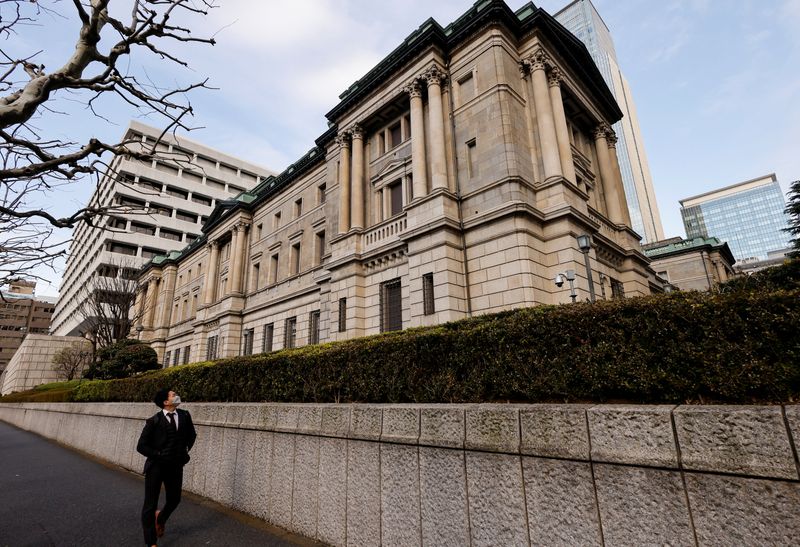By Leika Kihara
TOKYO (Reuters) -The Bank of Japan heralded the start of a slow shift away from decades of massive monetary stimulus on Friday, allowing the country's interest rates to rise more freely in line with increasing inflation and economic growth.
In what some analysts said could be a seismic shift for global financial markets, the BOJ made its bond yield control policy more flexible and loosened its defence of a long-term interest rate cap.
Global markets saw the move as Japan coming into line with other major central banks, which have aggressively tightened monetary policy to beat soaring inflation, after decades of aggressive stimulus in an effort to reflate growth.
While the BOJ kept interest rates at ultra-low levels and stressed the need to maintain support for the economy, it said the tweak to its bond yield curve control scheme (YCC) would allow it to respond "nimbly" to risks including rising price pressures.
BOJ Governor Kazuo Ueda brushed aside the view that the move was a step towards policy normalisation, instead describing it as a pre-emptive move against the risk of too-high inflation.
But he also said the bank could tweak policy further if the likelihood of sustainably hitting its 2% inflation target heightens, underscoring the sharper focus on price pressures.
"It is an important step towards eventual disbandment" of YCC, said Tom Nash, portfolio manager at UBS Asset Management in Sydney.
The BOJ kept unchanged its short-term rate target at -0.1% and that for the 10-year government bond yield around 0%.
It also maintained guidance allowing the 10-year yield to move 0.5% around the 0% target, but said those would now be "references" rather than "rigid limits".
The BOJ said it would offer to buy 10-year Japanese government bonds at 1.0% in fixed-rate operations, instead of the previous rate of 0.5%, signalling that it would now tolerate a rise in the 10-year yield to as much as 1.0%.
While some investors had expected a modest change in the BOJ's guidance, the announcement shook financial markets which have grown used to years of its ultra-conservative policy.
Japan's benchmark bond yield soared to a nine-year high. The yen strengthened 1.2% to as much as 138.05 per dollar before weakening 1% to 141.20.
Japanese banking stocks surged 4.6% to an eight-year high on the prospect of a steeper yield curve that would revive profit from lending.
The move could also have implications for global money flows and asset price trends, since a cheap yen has been a mainstay of capital market funding for years, with investors borrowing the currency to invest in higher-yielding assets.
"Although the BOJ left the cap unchanged at 'around 0.50%', the subtle changes in language suggest that they are gearing up, or at least open to, tweaking the YCC target at a future date, provided that conditions are supportive," said Carlos Casanova, senior Asia economist at UBP in Hong Kong.
Ueda said the BOJ wanted to reduce distortions caused in bond prices and keep volatility from heightening in the exchange-rate market.
"We'd like to have market forces drive bond yield moves more," Ueda said. "We don't expect the yield to move up to 1%, but have set this cap as a pre-emptive measure."
Board member Toyoaki Nakamura dissented, taking the view that while making YCC more flexible was desirable, the timing was premature.
OUTLIER MAKES BABY STEP
The BOJ's shift comes after its U.S. and European counterparts raised rates again, moves that could accelerate yen declines and push up Japan's import costs and inflation.
In its quarterly outlook report, the BOJ revised up this year's core consumer inflation forecast to 2.5% from 1.8% projected in April.
Ueda said the BOJ's move was driven partly by a sharp overshoot in this year's inflation expectations as more firms hiked prices and wages.
While its price forecasts for 2024 and 2025 were roughly unchanged from April, risks were skewed to the upside, the central bank said in the report.
"If inflation overshoots, we will respond appropriately," Ueda said.
The BOJ's action highlights the challenge it faces in balancing the risk of higher inflation and the need to keep supporting a nascent economic recovery.
While bond markets have been stable recently, the BOJ wanted to pre-empt another bout of volatility that could be caused by higher-than-expected inflation, Ueda said.
Since introducing its yield control scheme in 2016, the bank has had little trouble controlling yields when inflation remained well below its target. That changed last year when soaring commodity prices pushed inflation above the 2% target and gave investors reason to attack the yield cap.

After buying huge amounts of bonds to defend the then 0.25% ceiling, the BOJ last December widened the yield band and now allows the 10-year yield to rise by up to 0.5%.
"It's pretty hard to deal with the side-effects when you try to respond after upward risks materialise," Ueda said, adding that the BOJ wanted to avoid a repeat of the bond market turbulence seen last December.
